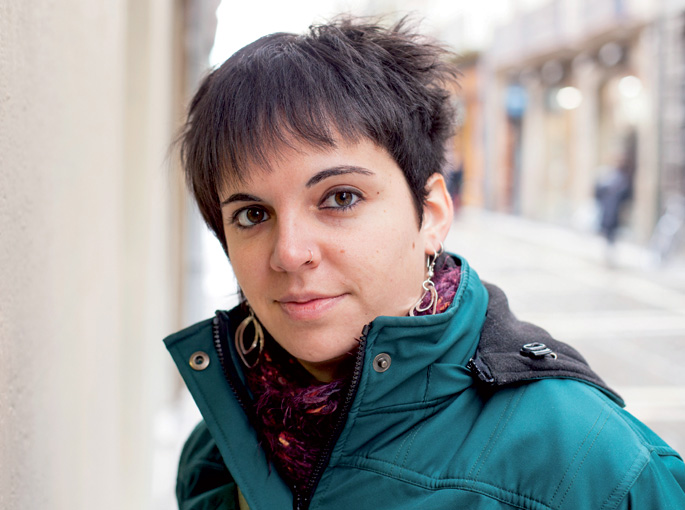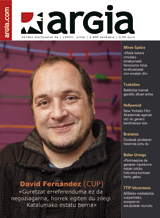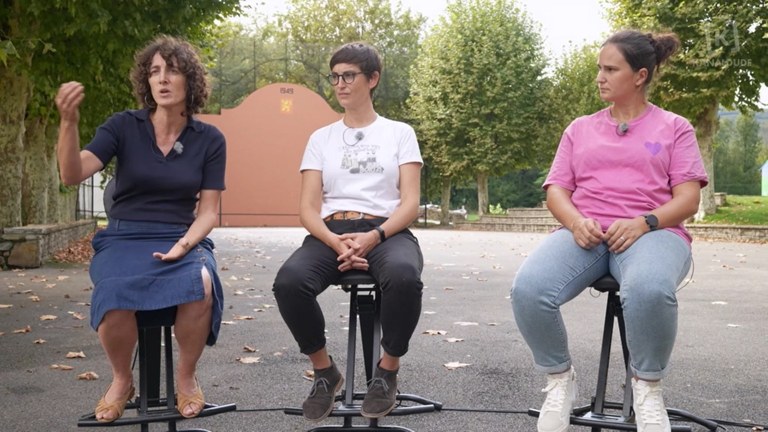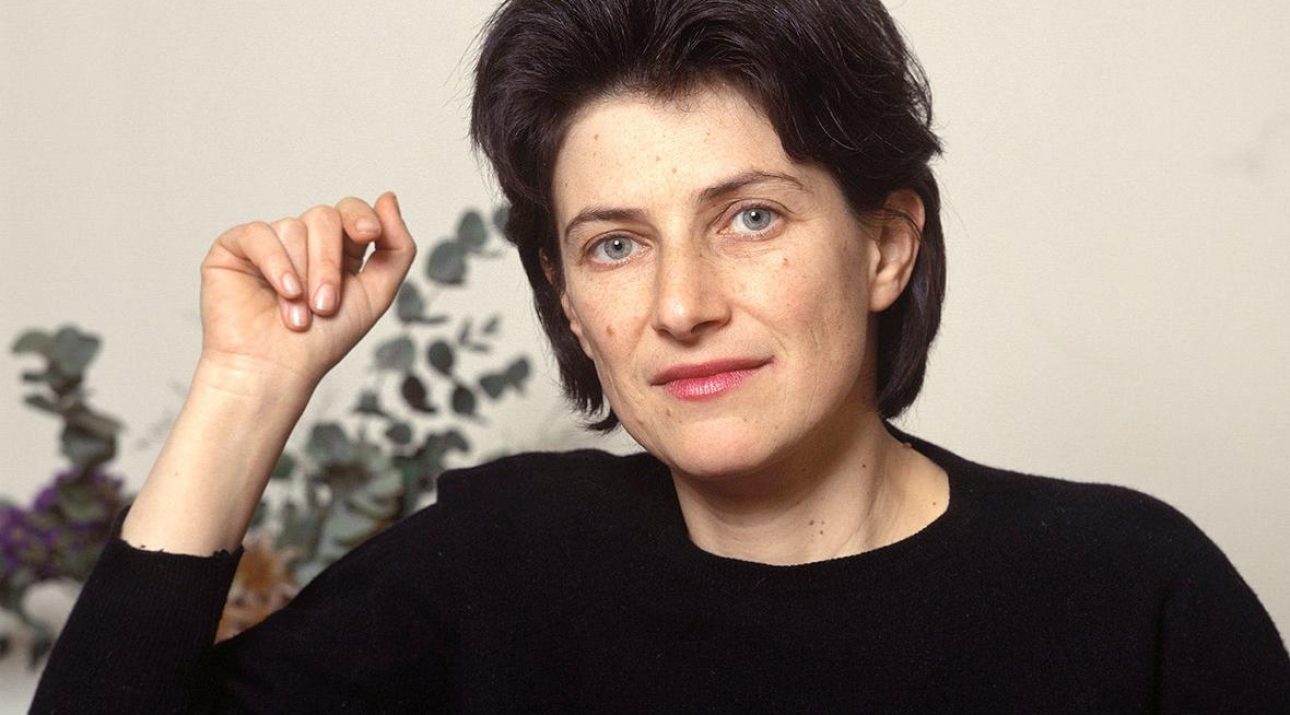"We live in a system that disregards life."
- According to the feminist economy, capitalism outweighs the benefit over life. Sometimes the hardest thing to see is what we have in front of our nose.

The dual university career (Business and Law Administration and Management) that you chose, does it serve to join the higher level of society?
That's what they say. What is sold to the students at the university when presenting these studies is that in the future there will be elite, businessmen, bank managers… I entered even though I did not close the doors. I wasn't very clear about what I wanted and I chose it because I was interested in law and economics.
In any case, men have more facilities to reach that elite, right?
That men and women are equal and we have the same rights and opportunities, that speech is very tight and in college, as you study, you live in that kind of dream, but then reality touches you in the face. We in the whole race have never read anything about women, about their participation in the economy, for example. This important part of reality is being concealed.
After graduating, you started learning what you really care about.
Yes. A few years ago, I participated in the IPES feminist school and I found it very good. It was clear that I wanted to do feminist studies, without giving up the word feminist. Sometimes they replace it with the word gender because they find it politically more correct, but I didn't want that. I tried to enroll in Peru to do the on-line master's degree in Bilbao, but since they did not receive me, I did so at the University Jaume I in Castellón. It has been a one-year master’s degree, very demanding and interesting.
What have you learned?
It's a transversal master's degree and you see many issues from a feminist point of view. The objective is to reclaim the prominence that has been taken away from women and to make their contributions visible in each of the areas.
What is being a feminist?
What feminism seeks is equal rights for all people, respecting inequalities. Today it is still very badly understood. It hurts me a lot to hear how women who have reached a level reject the word feminism. Furthermore, they unify contradictory things: “I’m not a feminist, but I believe in equal rights for men and women.” It is still thought that the feminist is a crazy woman, who hates men, ugly, often lesbian, radical… That we are radical, of course, because we are at the root of the inequality between men and women. That is why we are radical. Everything else is a myth. The attitude of devaluing this struggle.
To what extent is biology important?
Despite biological differences, it is evident that most conducts have been learned through socialization. The way we treat children is different from the way we are born: girls are told how beautiful and beautiful they are, and boys are told how fast they are. So we learn from a very young age what society expects from us. We learn by imitation. Men are taught that the way to solve any type of conflict is violence, but not by managing their feelings or channeling their aggressiveness in another way. On the contrary, in the field of feminist self-defence, it is said that women have been denied the ability to exert violence. That's why women don't have that point of aggression on many occasions. For example, if you feel in a bar that someone touches your ass, you often don't know what to do. You get stuck.
Is everything around you machista?
Yes, and it's also more dangerous now because we have very internalized that myth of equality. The Constitution says that we are all equal and believe. That blinds us, but then life teaches you that being a woman is not that easy. And that is here in Europe. Think about what's going on in many other places.
You have fully entered into research into the impact of the crisis on women. What does the crisis mean for women?
More work. In recent decades there have been great social achievements and the State has somehow assumed some of the work traditionally done by women. Now, however, the need to reduce public spending on neoliberal policies has become an obsession, which is allowing families to redirect these care. A reprivatization of care tasks is taking place and, in the end, it is women who are responsible for these tasks. It's a crisis of care.
The woman is the support or mattress of the system. Any change or crisis has a direct impact on families, and women are always the ones who, through their survival strategies, must adapt to these system changes. Now the same thing is happening. The question is how far this situation can be maintained. This crisis is not only economic, but structural, because we live in contradiction: we live in a system that disregards life and, at the same time, we must try to take care of life.
Why do you say that the system neglects life?
Capitalism outweighs profit over life. For example, the economy, as a science, always takes into account only what happens in the market, considering as external to the economy all processes related to life care. They are neither axes nor objectives. The crisis is clearly emerging the conflict between life and capital.
Would it then be a resumption of the solution?
Yes, rethink what society we want. The feminist economy puts the sustainability of life at the centre and proposes how to organize or build everything else around it. The market would be one more area of the economy, but not the centre.
What kind of society would that be? Let's dream a little bit.
A people-based economy. For a start, a social debate on work should be generated. Widening the concept of work and recognizing that it is not only about what is paid, but also about what is done to live and for people to live well. We should look at what jobs are needed for a dignified and non-dignified life and distribute among the members of society. Companies should be involved, for example, by paying a reproductive tax, because they ultimately need people to work. Or a progressive tax reform that would guarantee reproduction costs. We are putting our own lives at risk. We cannot continue in this way.
Nowadays, they try to reconcile work and family...
The present conciliation is a trap, because it is, after all, women who reconcile it. There are very few men who take advantage of the reduction in childcare work, for example, and if the system is maintained it is because those tasks are done, so we should redistribute them.
Is there a will to do so?
Nothing.
Your Master's Degree End Job, A Feminist Debt Criticism, Where Does It Go?
There is a very perverse speech on the debt of countries. Debt is high due to excessive private indebtedness, especially on the part of companies and banks. Through various mechanisms, private debt has become public debt, so we are returning the money that a few people used. In addition, history repeats itself. The crisis of the 1980s and the present crisis have the same origin and are being managed in the same way. What they did in those years with many countries in South America are now doing with those in southern Europe.
However, there are reasons for hope. As an example, we can observe the redefinition of the work carried out in the Constitution approved in 2008 in Ecuador. Some works that were not previously considered economic are now considered within the economy. There is recognition of the work of women. The conception of the Andean world has been based on the definition of the concept of “good living” they call. A balance must be struck between the person and nature. They have enshrined it in the Constitution and that is, at least in theory, moving away from the logic of capitalism. Then, how that is done is something else.
Has any consequence been seen in Ecuador?
Correa is not a feminist and on the subject of abortion, for example, he has a very reactionary attitude, but in other areas, such as external debt, very interesting decisions have been taken. Before the adoption of the Constitution, Ecuador ' s debt was subject to a public audit of a citizens ' nature. Once the data were collected, it was determined which part of the debt was legitimate and which one was not, and they refused to pay the latter. They saved $7.2 billion for non-interest payments and were dedicated to education, health and social policies. A good example of how external debt can be managed differently. Many times we are very Eurocentrists and forget to look at South America to see what alternatives they are proposing there. The audit they have carried out there, for example, has been very interesting for it to be done in Spain or in Greece, no doubt. There are platforms that demand it in many parts of Europe.
In Argentina, otherwise, they refused to pay the debt in the period 2001-2005. They are good examples of how a state can give up this payment. And the marines didn't invade them. Why? Because it's more dangerous than people and other countries to know that there's that possibility, that you don't charge your debt. They do not want such an effect to occur in the world. When the United States invaded Iraq in 2004, they also refused to pay the debt, claiming that it was an act dictated by a dictator. And they didn't give that any publicity.
The auzolan we know in Euskal Herria, the so-called matriarchy of women of yesteryear… are they good values when it comes to undertaking a new economy?
Auzolan completely breaks the capitalist and patriarchal logics: to decide between everyone what we need and to do between everyone. The role of women, on the other hand, has been mystified. The matriarchy has never existed here. Women have been important but inside the house; housewives. Society doesn't. The people who inherit the farmhouse were the men. It's a misleading discourse of the queen: you're the queen of the house. All right, all right, and out of the house what am I? You have to be careful about that.
What do you think of the role of women in senior positions?
Women, as well as money, have no good relationship with power. It seems that when we get the power, we have to masculinize our position so that we really take notice of it. We seem to have to be aggressive, to shout more, and I think we have to rethink power in a more feminine way. We have to introduce other values: debate things, do it collectively, share power… What has happened throughout history has been that in the public sphere masculine values have been imposed, leaving women in the private sphere: altruism, solidarity, etc. Now, with the crisis, we're seeing every day how those feminine values are expanding. With mortgage issues, people are coming together and claiming collective work. Although in many countries things are still held collectively, globalization has driven an increasingly individualistic life.
How does religion affect women's ways of life?
It must be borne in mind that, like religion, law, the economy or any other institution, patriarchy uses it according to its interests. One thing is how religion is used and another. I, for example, have done a very interesting study on Islamic feminism, and I have to admit that I have been broken by schemes. Islamic feminists argue that the Qur’an is not a chauvinist in itself, but that there are some interpretations that are made about it. It's a very interested speech to say, "Look at how bad these poor women are who have to wear a scarf," so you don't realize what you have to suffer in your daily life. What the Westerners are asking us is not to judge in advance.
Movements like Femen: benefit or harm to feminism?
At least a couple of things have to be recognized: they carry out prestigious actions denouncing the Church’s obsession with controlling women’s lives and bodies and, on the other hand, remind us that we can use our body as a space for struggle, something institutional feminism has forgotten.
Miren Epalza Ronkal. Iruñean sortua 1988ko maiatzaren 13an. Nafarroako Unibertsitate Publikoan Enpresen Administrazio eta Zuzendaritza eta Zuzenbidea karrera bikoitza egin ondoren, ikasketa feministetan murgildu da, ekonomia feministan espezializatuz. Aita bezala, liburu jale amorratua da Aingeru Epaltza idazlearen alaba. Elkarrizketa Iruñean egin genuen Perurako hegazkina hartu baino ordu batzuk lehenago. Orain han da, Chiclayo hiriko Señor de Sipán unibertsitatean klaseak ematen.
25 urte besterik ez eta ideiak oso garbi ditu. Orain bere kemena eta liburu pila maletan sartu eta Perura joan da laugarren aldiz. Aurrekoetan Emakumearekiko konpromezua izeneko GKEarekin elkarlanean aritu da bertakoekin, alderdi feminista eta ekologista batzen dituen hainbat proiektutan. Orain haiekin jarraitzeaz gain, feminismoa alor unibertsitarioan zabaltzea eta bertan eskola feminista bat antolatzea ditu helburu.
“Ekuadorrek kanpo zorraren ordainketaren gainetik ‘Buen vivir’ xedea lehenetsi duen bitartean, Espainiak juxtu kontrakoa egin du: PP eta PSOE ados jarri, konstituzioa aldatu, defizitari muga jarri eta zorraren interesak ordaintzea edozein gastu publikoren gainetik jarri dute”.
“Ikearen iragarkiaren ideia hori oso arriskutsua da komunitatea atomizatzen duelako. Bakoitza bere etxean sartzen da eta han oso gustura egoten gara Ikeako altzari pila dugulako, baina horrek egiten duena da kanpoko harremana galtzea eta sare sozialak ahultzea”.
Indartsua, irribarretsua eta oso langilea. Helburu pila bat ditu esku artean, eta ideia bat okurritzen zaionean buru-belarri aritzen da horretan. Horiek dira Ainhoa Jungitu (Urduña, Bizkaia, 1998) deskribatzen duten zenbait ezaugarri. 2023an esklerosi anizkoitza... [+]
Gozamen aparta bezain deskribatzeko zaila dakar, norbaiten hitzak irakurri edo entzun ostean, zera pentsatzeak: “Horixe zen neu aurreko hartan azaltzen saiatu nintzena!”. Idazlea eta itzultzailea da María Reimóndez, eta galegoz aritzen da, hizkuntza... [+]
Orain arte desgaituak ez diren pertsonekin lehiatu da Uharteko Ipar Eski Taldeko Eneko Leyun eskiatzailea (Iruñea, 1998). 2024-2025 denboraldian, lehenengo aldiz parte hartu du Adimen Urritasuna duten Pertsonentzako Iraupeneko Eskiko Espainiako Txapelketan. Urrezko... [+]
Joan den urte hondarrean atera da L'affaire Ange Soleil, le dépeceur d'Aubervilliers (Ange Soleil afera, Aubervilliers-ko puskatzailea) eleberria, Christelle Lozère-k idatzia. Lozère da artearen historiako irakasle bakarra Antilletako... [+]
Endometriosiaren Nazioarteko Eguna izan zen, martxoak 14a. AINTZANE CUADRA MARIGORTAri (Amurrio, 1995) gaixotasun hori diagnostikatu zioten urtarrilean, lehen sintomak duela lau urte nabaritzen hasi zen arren. Gaitz horri ikusgarritasuna ematearen beharraz mintzatu da.
Duela aste batzuk, gurean egon ziren El Salvadorko eta Kanarietako emakumeen eskubideen aldeko hainbat aktibista. Sexu- eta ugalketa-eskubideez eta eskubide horiek urratzeak emakumeengan dituen ondorioez aritu gara; hala nola El Salvadorren berezko abortuak izanda homizidio... [+]
Zuberoako ohiturei buruzko bi liburu ditut gogoan. Batek XX. mendean aritu izan diren 180 dantzari eta soinulari aipatzen ditu. Haien artean, emakumezkorik ez da agertzen. Besteak, pastoralei egiten die errepasoa eta hor emakumeak aipatu aipatzen dira, baina omisio esanguratsuak... [+]
1984an ‘Bizitza Nola Badoan’ lehen poema liburua (Maiatz) argitaratu zuenetik hainbat poema-liburu, narrazio eta eleberri argitaratu ditu Itxaro Borda idazleak. 2024an argitaratu zuen azken lana, ‘Itzalen tektonika’ (SUSA), eta egunero zutabea idazten du... [+]
Donostiako Tabakaleran, beste urte batez, hitza eta irudia elkar nahasi eta lotu dituzte Zinea eta literatura jardunaldietan. Aurten, Chantal Akerman zinegile belgikarraren obra izan dute aztergai; haren film bana hautatu eta aztertu dute Itxaro Bordak, Karmele Jaiok eta Danele... [+]
Antifaxismoari buruz idatzi nahiko nuke, hori baita aurten mugimendu feministaren gaia. Alabaina, eskratxea egin diote Martxoaren 8ko bezperan euskal kazetari antifaxista eta profeminista bati.
Gizonak bere lehenengo liburua aurkeztu du Madrilen bi kazetari ospetsuk... [+]
Pertsona lodiek lodiak izateagatik bizi izan duten eta bizi duten indarkeriaren inguruan teorizatzeko espazio bat sortzea du helburu ‘Nadie hablará de nosotras’ podcastak. Cristina de Tena (Madril, 1990) eta Lara Gil (Fuenlabrada, Espainia, 1988) aktibista... [+]
























